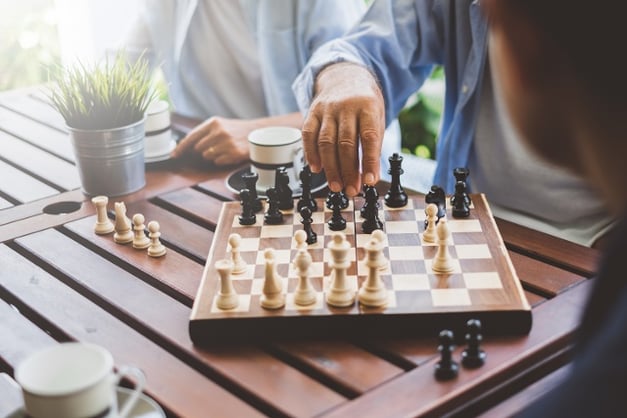
Aging presents itself with a variety of opportunities for individual growth and continued development. Being a lifelong learner may just be the key to keeping your brain sharp and slowing the onset of memory related ailments. Engaging in brain training games that rely heavily on strategy and quick thinking have been linked to improving memory, response time, logic skills, and improved cognitive function. Whether it's a word puzzle, number game, or picking up a new hobby, there are a variety of brain exercises out there that you can do to boost overall cognitive health, memory retention, and even creativity.
Here are 10 brain exercises you can start incorporating into your daily routine, many of which you can find for free online, for the betterment of your cognitive health.
10 Brain Exercises
Sudoku
This game strengthens short-term memory as it requires high levels of concentration and critical thinking. You can play sudoku online, with an app on your phone or tablet, from a book, or by finding one in your local newspaper.
Crosswords
Crosswords are a classic brain trainer, accessing not only your working vocabulary but requiring retention of accumulated knowledge to determine the word clues. There are many ways to do crossword puzzles. If you receive a daily newspaper, you'll almost always get a crossword there. If you are particularly interested in a certain subject, you can purchase a book of crosswords specifically suited to your skill level and interests. Besides being a fun way to pass the time, there is a strong correlation between habitual crossword devotees and delayed onset of dementia.
Wordle
If you have tried your hand at crosswords and are looking for something a little less time consuming and more mobile, give Wordle a try. This daily online word guessing game recently acquired by The New York Times has people of all ages engaged. Similar to crossword puzzles, Wordle tests your vocabulary recall and spelling abilities. With a new word everyday, this is a super easy and fun way to include a brain exercise into your daily routine.
Chess
Chess is an excellent brain game and an engaging social opportunity if you choose to play in person. There are free online chess apps and communities where you can play against a computer program or live people if playing someone in-person is not available to you.
Chess helps improve your memory and executive functioning, also known as the ability to monitor and adapt behavior in order to meet set goals (in this case, obtain your opponent’s pieces). Playing games where you must predict your opponent’s next move has also been associated with increased cognitive processing speeds.
Checkers
If you find chess to be a bit complicated,why not try its close relative, checkers, instead? A 2015 study found a connection between regular participation in checkers (and similar cognitively stimulating games such as chess) with larger brain volume and better cognitive health in people at risk of Alzheimer’s disease.
Learn a New Language
Perhaps you are a traveler or like the idea of communicating and learning from people of different backgrounds. A 2019 review notes that bilingualism (the ability to speak two or more languages) increases and strengthens connectivity between different areas of the brain. The enhanced connectivity may play a role in delaying the onset of Alzheimer’s disease and other forms of dementia.
Research also suggests that learning a new language can even help you recover faster from a stroke. On top of that, you will be exposing yourself to an entirely new culture and community, which is a learning experience in itself!
Learn a New Instrument
Not into languages? Try the language of music. Simply listening to music can increase retention and improve over all personal well-being. The benefits of music are extensive, and learning to play a new instrument is an excellent way to keep your mind agile.
Queendom
Queendom is an online resource that has thousands of personality tests and surveys you can take. It also has an array of brain exercises including logic, verbal, spatial, and math puzzles; trivia quizzes; and aptitude tests. The choice is yours on how you want to exercise and test your brain with Queendom!
Take up a New Hobby
There are endless opportunities to stimulate our minds and improve our overall well-being. Neurosurgeon and CNN Chief Medical Correspondent Sanjay Gupta, MD reports that “the brain remains plastic throughout life and can rewire itself in response to your experiences”. Regular mental workouts create new neurons and neural connections – a process called neuroplasticity – and can slow or prevent cognitive decline.
Taking up a new hobby, such as gardening, yoga, drawing, or playing board games (just to name a few) are excellent ways to keep your brain active, boost creativity, and help memory retention.
Be Mindful
The Mayo Clinic now promotes meditation as a powerful way to reduce stress, and the National Institutes of Health cite research that meditation may ease symptoms of depression, anxiety, and even help people struggling with insomnia. Mindfulness is the practice of training our minds to stay in the present moment. This strengthens our connections to control attention, overall boosting memory retention.
So there you have it, 10 excellent ways to engage your brain to help boost creativity and memory retention. If you have any questions, or are looking for more ideas to stay physically and cognitively healthy as an older adult, feel free to reach out to our dedicated team members at communities managed by The Goodman Group.


